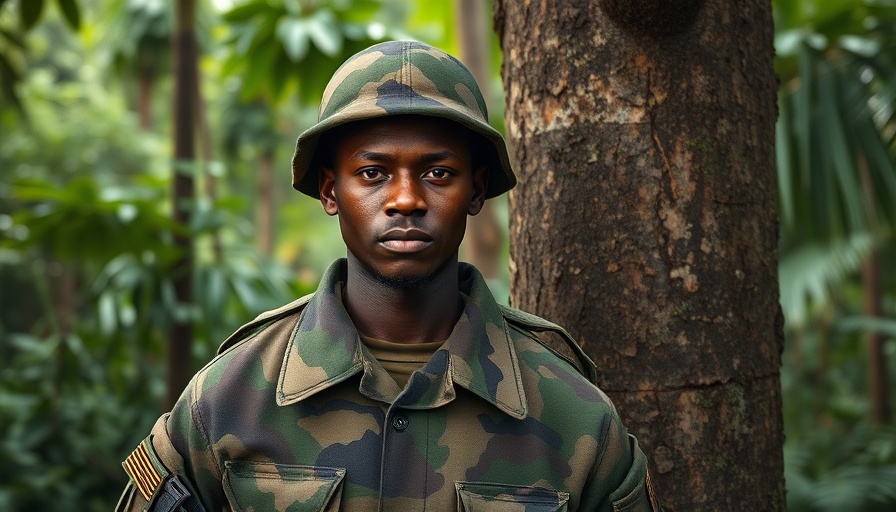
Rising Military Costs: A Crisis in the DRC
The Democratic Republic of Congo (DRC) finds itself in a precarious situation, grappling with soaring military expenses and dwindling tax revenues due to continuous offensives led by Rwandan-backed rebels. Recent updates reveal that these insurgents have taken control of significant portions of the eastern borders, severely hampering governmental operations and public finance.
Economic Implications of Warfare
The International Monetary Fund (IMF) has expressed concerns regarding the escalating conflict’s impact on the DRC's economy. Public finances are suffering, partly due to the closure of revenue collection offices in areas now under the control of the M23 rebel group. The crisis is exacerbating an already troubling financial landscape where military spending increases are outpacing revenue generation.
This shift is starkly illustrated by the cabinet's recent budget proposals, which now foresee a gross spending reduction of $17.2 billion. However, this figure masks a worrying trend: tax revenues are projected to dip to 12.5% of GDP, down from previous expectations of 15.1%. As Finance Ministry officials double soldiers' pay in a bid to bolster morale, the costs are steep, with estimates ranging from $500 million to $1 billion in exceptional security expenditures in just the first four months of this year.
Impact on National Stability and Security
The DRC's internal stability hangs in the balance as military officials raise alarms about shortages in vital resources such as food, ammunition, and equipment. A military general candidly admitted that much of the available budget appears funneled into arms procurement. Yet, the lack of transparency over these allocations remains a significant issue within the Finance Ministry, where high-level discussions about military funding occur outside the standard budgetary oversight.
It is important to note that the conflict is not just an isolated military issue but deeply affects broader socio-economic conditions in the DRC. Significant regions lost to rebels are rich in natural resources, including gold, tin, and coltan, which are crucial for both the local and international markets. It is estimated that the ongoing warfare could lead to a 4% shortfall in expected tax revenues, further complicating fiscal recovery efforts.
The Broader Context: International and Local Dimensions
This military and economic narrative unfolds against a backdrop of larger systemic issues within the DRC, such as corruption and governance challenges that have historically plagued the nation. Recently, discussions surrounding the anticipated national elections have pointed to potential political unrest as various groups, including the Democratic Alliance and the Economic Freedom Fighters (EFF), express concerns about governance and service delivery amidst rising dissatisfaction.
The situation in the DRC poses significant questions about international engagement and assistance strategies going forward. With events like the upcoming BRICS summit and the role of the African Union in seeking peace in the region, the global community must consider its strategic partnerships and economic assistance beyond mere financial contributions.
Future Considerations: Is There a Way Forward?
As the DRC navigates this complex landscape of rising military costs against falling tax revenues, various factors will play into long-term recovery and stability. The government's attempt to balance military spending with social needs is fraught with challenges, especially amid high unemployment rates and ongoing concerns about public health and educational reforms. There is a pressing need for flow transparency in financial allocations and for a reevaluation of military-first policies that have traditionally led to critical administrative overhauls lacking in accountability.
This situation invites urgent conversations about state capture and systematic corruption investigations that could help realign the focus of public spending toward infrastructure, education, and healthcare—domains that tend to deteriorate as military budgets are prioritized.
Conclusion: Time for Accountability?
The DRC's military expenditure crisis illustrates the troubling intersection of conflict, governance, and economic instability. As military needs grow, a transparent and accountable approach to budgeting must prevail to foster trust among citizens and international partners. For those watching closely, the coming months will be critical for ensuring that military spending does not overshadow the fundamental needs of a nation in turmoil. It’s time for the DRC to evaluate its commitments and recalibrate its approach towards creating an inclusive, stable, and sustainable future for all its citizens.
 Add Row
Add Row  Add
Add 




Write A Comment